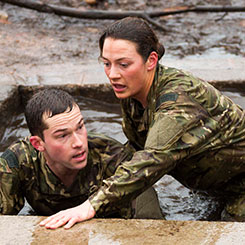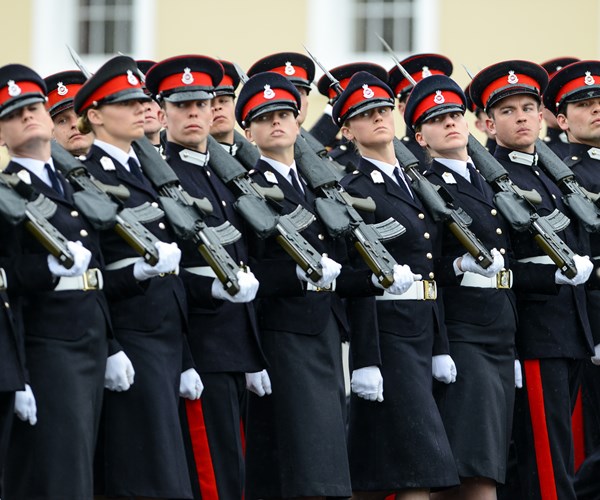
Recent studies have been released which show that the treatment of women in the Forces is still a matter of concern at a time when all jobs have been opened up to them on the same basis as men. In particular, a number of reports have highlighted the level of sexual abuse which, according to some, indicate that each year some 10% of all women in the three services are exposed to this problem.
Of the 126 cases reported in 2017, for example, some 80% of the victims were women. In addition, of the 118 suspects reported, 115 were male. The reports go on to point out that only 29 of those accused were actually found guilty and convicted of an offence.
If one looks at the wider picture of all forms of complaint taken to the Service Complaints Ombudsman for the Armed Forces, it shows that while women only form 10% of the Armed Forces, their complaints amounted to 20% of all those reported in 2017. In a related finding, it is further reported that the majority of those making a report to the Ombudsman were dissatisfied with the way their complaints were handled – though of course this is not directly related to the question of the treatment of women as the majority (80%) of complaints were made by males in the first place.
It is hard not to become caught up in the emotional aspect of this sort of reporting which is frequently supported by a degree of hyperbole describing conditions which might not really exist on the ground. Suggestions that the consequences of this sort of problem “could be dire” to the Armed Forces are not terribly helpful, as they tend to put people on the defensive who might otherwise be very ready to accept the issue and more than willing to work to sort out the problem.
That said, we as a society have to face the facts about the sorts of people who enter the forces in the first place. These are not necessarily shy, retiring sorts whose one aim is to secure “world peace and international harmony”. Many young types join the forces for some action and adventure, and do so knowing that they might well have to go somewhere and offer violence to some strange person in the name of the British Crown and Government. We, as a nation, are very happy for them to be there and to do their level best to kill the enemy when we need them to, but then start to get squeamish when those same people offend our sensibilities in time of peace.
This problem was characterised by the Kipling poem “Tommy”. Here is the middle verse:
Yes, makin’ mock o’ uniforms that guard you while you sleep
Is cheaper than them uniforms, an’ they’re starvation cheap.
An’ hustlin’ drunken soldiers when they’re goin’ large a bit
Is five times better business than paradin’ in full kit.
Then it’s Tommy this, an’ Tommy that, an` Tommy, ‘ow’s yer soul? “
But it’s ” Thin red line of ‘eroes ” when the drums begin to roll
The drums begin to roll, my boys, the drums begin to roll,
O it’s ” Thin red line of ‘eroes, ” when the drums begin to roll.
However, Kipling’s Tommies would never have envisaged a time when women were serving in the frontline, and they never found themselves in such close proximity to women in circumstance in which, to be frank, many civilian niceties tend to get left behind. For example, the Navy discovered in WW2 that when there were a number of females aboard a ship that was sunk, the total casualties seemed to be strangely higher them might be expected. After looking into the problem they discovered that a woman at the back of a queue waiting to go up a ladder or hatch might be given priority over the men ahead of her, causing congestion and delays that led to increased overall casualties. As a result, orders were issued that it was not a case of “women and children first” if the women in question were serving members of the Forces.

Armies have for many decades wrestled with the problems of trying to reconcile the treatment of women soldiers in war with that expected by the female population in peacetime. In WW2, for example, female Russian Partisans were just as capable of shooting a German soldier as their male counterparts. And so the notion that the summary execution of females was somehow intrinsically abhorrent might have been lost on those meting out “justice” in the wilds of the Russian Steppes.
The same considerations cannot be applied to the male personnel in the Falkland Islands garrison who, according to one complaint, subjected new female arrivals at their unit to initiation ceremonies that involved humiliating sexual suggestion. Any such rituals often tread a fine line between fun and outright bullying and, whether inflicted upon a male of female, can have a really devastating impact on that person for many years to come.
That said, in any attempt to put a stop to sexual bullying of this sort, we must not set out to treat women so very differently to men that the whole argument about everyone “being the same” is so obviously a myth that it attracts scorn and derision from those who are most a risk of crossing the line mentioned above.
The Armed Forces are there because they are robust, military well-trained and tough defenders of our country. To think that they are all going to behave as if they were at a Vicar’s Tea Party every hour of the day is simply daft. The same applies to both men and women. Let them have their fun and accept that the odd “bash and bruise” is par for the course and part of life in the Forces. However, anything more than that is absolutely not acceptable and that much should be made abundantly clear to all, whatever their rank or position.

Comments on Treatment of women in the Armed Forces is not always acceptable